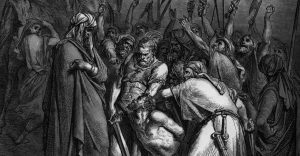Last year for the first time, my husband and I watched It’s a Wonderful Life, Frank Capra’s 1946 Christmas classic. Widely considered one of the best films of all time despite a disappointing box office debut, Capra’s story surprised me first with its rather depressing premise: a young man, George Bailey (James Stewart), who has buried his personal dreams for the sake of his family and community, contemplates suicide on Christmas Eve after a series of mishaps leaves him facing financial ruin.
In a clever twist on A Christmas Carol, George’s guardian angel, Clarence Odbody (Henry Travers), grants George’s wish to have never been born, showing him in the process how many lives he has touched without realising, and reigniting in him the desire to live.
It’s a Wonderful Life is a beautiful film and it moved me to tears to watch George Bailey comprehend not only the importance and usefulness of his smallest actions, but the specialness of the blessings he once took for granted. It’s a powerful lesson in gratitude and a reminder that humans are more than their bucket lists or to-do lists.
The cornerstone of the film’s message is a scribbled note from Clarence the guardian angel: “Remember, no man is a failure who has friends.” As I contemplated this line, it jarred me a little. If a man with friends—and George Bailey had many, as it turned out—has no reason to think himself a failure, could the converse be true? Are the friendless failures? Was George Bailey’s life only considered worth preserving because of his relational accomplishments, his hitherto-unrecognised value to his family and to his community?
Living in a Post-Pandemic World
If Clarence Odbody is correct then millions of people around the world are destined for failure and unhappiness in coming years. Recent surveys by Gallup and the Survey Center on American Life suggest that we have far fewer close friends than we once did. Twelve percent of Americans in 2021 reported having no close friends, up from three percent in 1990. Only half of Americans were satisfied or completely satisfied with their number of friendships.
A 2021 survey by YouGov found that fifty-eight percent of Britons have ten or fewer friends; twelve percent report having just one close friend, forty-one percent having two or three. Seven percent said they did not have a close friend at all.
Though this is American and British data, I suspect it holds true for us in Australia as well. Whether you blame (as researchers do) the changes wrought by the COVID-19 pandemic, or increased geographical mobility among younger people, longer working hours, parents spending more time with their children (leaving less time for forming friendships), or social media, it appears that the loneliness pandemic is in full sway.
And with the health risks associated with social isolation and loneliness being equated to smoking fifteen cigarettes a day, we might wonder if George Bailey and Clarence Odbody had the right idea about the centrality of friendship.
A Wonderful Life?
It was at this point that I recognised the subtle humanistic, even utilitarian thread weaving through It’s a Wonderful Life, along with much of the content we consume today: the value of a human life is in large part determined by its usefulness.
I don’t think it’s a stretch to say that this kind of logic shapes our ethics and policies on euthanasia and abortion; our assessments that a person’s importance is influenced by their contribution as worker, parent, taxpayer and yes, by the perceptions of their friends.
In 2023, we are also far more conscious than our ancestors of our personal image. And we have the means to cultivate that image with our resources and our technology. Our relative wealth in comparison to the rest of the world and to our grandparents and great-grandparents gives us all the necessary ingredients to produce a picture-perfect family celebration this Christmas. The table setting is perfect. The house is immaculate… at least for ten minutes. The presents are beautifully wrapped and the tree is draped with tinsel, baubles, and lights. The spread is delicious. The fun we are all having, with our matching Christmas PJs and our personalised Christmas stockings and our front yard full of Christmas lights is enviable.
Life looks so good, so why does it sometimes feel so bad?
When the Fellowship Breaks
In the world of clinical psychology, where I used to practice, Christmas is quite often a dreaded time. A period of increased stress, psychological, physical, and financial; exposure to sources of temptation (like alcohol); relational tension and upheaval; and the pressure from family, friends, and even broader society to have made some kind of reportable progress in the year past—to have achieved something with respect to some aspect of the Australian Dream. Is it any wonder that forty-six percent of Aussies say that Christmas is a difficult time for them?
Part of the angst, I think, results from holding up an imperfect or even fractured life to the glittering ideal that society presents and feeling the mismatch. We’ve received Ds and Es all year long, but Christmas collates all our grades on a report card we then have to show to the people we care about. Meanwhile it looks like everyone else is getting As. To add insult to injury, we’re then asked to smile for the camera and pretend nothing is wrong.
Back to the Stable
When I find myself feeling this way, I go back to the simple lodgings where Jesus was born. It’s not a neat, tidy nativity scene with clean straw and washed clothes and the comforts of modern plumbing. There are animals with their bleating, perhaps squawking, (and poop); Jesus is likely crying at times (because he’s a baby), teenage Mary’s likely exhausted, and the long-awaited Redeemer of the world is lying in a feed trough. Oh, and everyone thinks Mary has secretly been living a double life and Joseph is the world’s most gullible fool.
How lovely. But, actually, isn’t it lovely? How have we strayed so far from this picture in which everything is going horribly wrong and yet at the same time is wonderfully right? The point of Christmas—the point I think we’ve largely forgotten—is to give hope to those who have none, not to paint a scene in which nothing is amiss. It is a picture that echoes perfection, but it is not itself picture-perfect. As the carol goes:
Long lay the world
In sin and error pining
Till He appeared
and the soul felt its worth.
The True Measure of Our Worth
It’s Jesus, not our friendships, who reveals our true worth. We are not spared inadequacy or failure because of how many friends we have, or because we’ve done a lot of good things that have gone unnoticed until our guardian angel points them out. No, we’re counted worthy because God considered us valuable enough to send his Son to save us. Jesus, the only perfect man, becomes the friend of sinners, a friend to those nobody else will befriend (Matt 11:19). And he’s with us for the long haul. As ‘O Holy Night’ so beautifully declares: “The King of kings lay thus in lowly manger/In all our trials born to be our friend.”
Granted, other friendships are not proven moot because of the ultimate friendship we have with our Saviour. We are called to love each other—deeply, and above all (1 Pet 4:8). But not only our friends—our enemies too (Matt 5:44). We are called to follow Jesus’ example.
You’ve Got a Friend In Me
This Christmas, if you’re feeling friendless and lonely, know that you have a Friend who knows what it’s like to be utterly alone (Heb 4:15). A friend whose own friends abandoned him in his hour of greatest need, right after they vowed to always stick around (Matt 26:26–56).
Jesus came to lonely, captive, exiled Israel. And he comes to you, to share your table and eat with you (Rev 3:20)—not just at Christmas, but whenever you ask him to. He doesn’t mind if your life (or your spread) doesn’t look so wonderful—he’s used to humble lodgings. He knows your need. He’s no stranger to weakness. And with such a friend as Jesus, no person can be called a failure.















